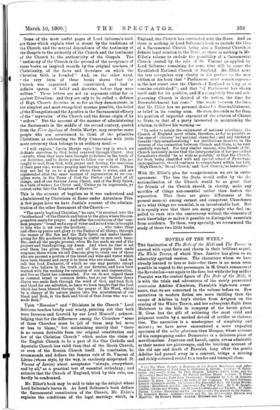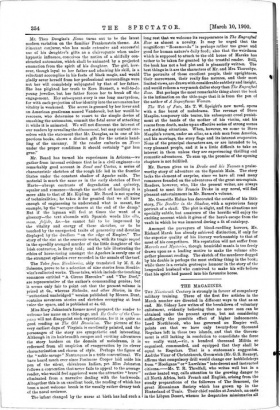NOVELS OP THE WEEK.*
THE fascination of The Reds of the Midi and The Terror is exerted with equal force and charm in their brilliant sequel, The White Terror, of which Mine. Janvier has given as an admirably spirited version. The characters whom we have already learned to love or hate—for there is no mean term possible in regard to the personages in M. Gras's romances of the Revolution—are again to the fore, but while the boy soldier Pascalet was the central figure of The Reds of the Midi, it is with the trials and adventures of the sorely persecuted comtessitte Adeline d'Ambrun, Pascalet's high-born sweet- heart, that we are concerned in the volume before us. Few narratives in modern fiction are more thrilling than the escape of Adeline in boy's clothes from Avignon on the coming of the White Terror, and her subsequent flight from Malemort to the hills in company of the heroic priest. M. Gras has the gift of achieving the most vivid and poignant results by a method devoid of artifice or elabora- tion. The narrative is a masterpiece of simplicity and naïveté; we have never encountered a more engaging specimen of the miles gloriosus than Margan, whose account of his campaigning under Dumouriez is a delicious piece of meridionalism. Janetottn and Lazuli, again, are as admirable as their names are picturesque, and the touching account of the old age and death of Pascalet, long after the gentle Adeline had passed away in a convent, brings a stirring and richly-coloured recital to a tender and tranquil close.
• (1.) l'he White Terror: a Romance of the French Revolution and Afire% Prom the Provencal of Felix Gras by Catherine A. Janvier. London : W. Heine- mann. [es.]---(2.) Nemo. By Theo Douglas. London : Smith, Elder, and Co. (68.)—(3.) Sand and Cactus. By Wolcott be Clear Beard. London : T. Fisher Unwin. [6s.]—(4.) Tales from Sienkiewicz. Translated by S. C. de Solssons. London : G. Allen. [6.5.1-0.1 By Order of the Company. By Mary Johnston. London : Constable and Co. [es.]—(6.) The Engrafted Rose. By Emma Brooke. London : Hutchinson and Co. [es.]—(7.) The Web of Fate. By T. W. Speight. Lonabn Chatto and WIndos. [3s. 61]—(S.) Drake and his Yeomen. Br Anal Barnes. London : Macmillan aud Co. [8s. ed.]—(9.) The Dweller in the shadow. By Grenville Hohns. London:' Sands and Co. i3s. ed.]—(10.) Harrel* and Mysteries. By Richard Marsh. London : Methuen and Co. NO
Mr. Theo Douglas's Nemo turns out to be the latest modern variation on the familiar Frankenstein theme. An itinerant conjuror, who has made extensive and successfnl use of his daughter's gifts as a clairvoyante when under hypnotic influence, conceives the notion of a skilfully con- structed automaton, which shall be animated by a projected emanation from the spirit of his daughter. The girl, how- ever, though loyal to her father and admiring his skill, is a reluctant accomplice in his feats of black magic, and would gladly sever herself from her professional surroundings were not her will completely subjugated by that of her father. She has plighted her troth to Ezra Burnett, a well-to-do young jeweller, but her father forces her to break off the engagement. Her subsequent story is one long martyrdom, for with each projection of her identity into the automaton her vitality is weakened. The secret is guessed by her lover and an American gentleman named Vandereck, but her would-be rescuers, who determine to resort to the simple device of smashing the automaton, commit the fatal error of attacking it while it is animated. We will not discount the interest of our readers by revealing the denouement, but may content our- selves with the statement that Mr. Douglas, as in one of his previous books, shows a distinct gift for the artistic hand- ling of the uncanny. If the reader embarks on Nemo under the proper conditions it should certainly "gar him grue."
Mr. Beard has turned his experiences in Arizona—we gather from internal evidence that he is a civil engineer—to remarkably good account in Sand and Cactus, a series of characteristic sketches of the rough life led in the frontier States under the constant shadow of Apache raids. The material is much the same as in the early sketches of Bret Harte—abrupt contrasts of degradation and quixotry, squalor and romance—though the method of handling it is more akin to that of Mr. Kipling. Mr. Beard is not sparing of technicalities ; he takes it for granted that we all know enough of engineering to understand what is meant, for example, by the "scraper-chasers at the end of the dump." But if the layman will feel at times the want of a glossary—the text abounds with Spanish words like olla, mesa, frijole, Sze.—he cannot fail to be impressed by the vitality and energy of these sketches, or to be touched by the unexpected traits of generosity and devotion displayed by the dwellers "on the edge of Empire." The story of the riot at the reservoir works, with its tragic sequel in the speedily avenged murder of the little daughter of the Irish contractor, is finely told ; and the tale illustrating the ethics of horse-racing amongst the Apaches is surely one of the strangest episodes ever recorded in the annals of the turf.
The Tales from Sienkiewiez, ably translated by M. S. de Soissons, prove to be a selection of nine stories from Sienkie-
wicz's collected works. These tales, which include the touching romances entitled "A Circus Hercules" and "The Duel," are representative of the author's commanding genius ; but it seems only fair to point out that the present volume is priced at 6s., whereas Sielanka, and other Stories, in the "authorised unabridged" version published by Messrs. Dent, contains seventeen stories and sketches occupying at least twice the space, and is published at 4s. 6d.
Miss Mary Johnston's former novel prepared the reader to welcome her name on a title-page, and A,/ Ortlel. qf the Com- pany will not disappoint such expectations, for it is (mite as good reading as The Old Dominion. The picture of the very earliest days of Virginia is excellently painted, and the personages of the story are sympathetic and interesting. Although in its hairbreadth escapes and exciting adventures the story borders on the domain of melodrama, it is redeemed from all suspicion of exaggeration by its clever characterisation and charm of style. Perhaps the figure of the "noble savage" Nantanquas is a trifle conventional. We have heard much ever since Fenimore Cooper laid aside his pen of the silent, chivalrous Indian, yet Miss Johnston follows a convention that never fails to appeal to the average reader, who would feel aggrieved were the attractive "brave" eliminated from a narrative dealing with the backwoods. Altogether this is an excellent book, the reading of which has been a most welcome break in the usually rather dreary task of the novel reviewer.
The infant changed by the nurse at birth has had such a
long rest that we welcome its reappearance in The Engrafted Rose as almost a novelty. It may be urged that the magnificent "Rommunda " is perhaps rather too great and good for human nature's daily food ; also that the weirdness which is snpposed to attach to the old house of Marske has rather to be taken for granted by the trustful reader. Still, the book has not a bad plot and is pleasantly written. The best things in it are the characters of Mr. and Mrs. Thoresbye. The portraits of these excellent people, their uprightness, their narrowness, their really fine natures, and their most limited views, are drawn with considerable subtlety and insight, and would redeem a very much duller story than The Engrafted Rose. But perhaps the most remarkable thing about the book is the intimation on the title-page that it is from the pen of the author of A Superfluous Woman.
The Web of Fate, Mr. T. W. Speight's new novel, opens with a fine burst of melodrama. The revenge of Steve Masplin, temporary tide tenter, his subsequent cruel punish- ment at the bands of the mother of his victim, and his rescue from death, make up an effective series of strong scenes and striking situations. When, however, we come to Steve Masplin's return, under an alias, as a rich man from America, and his marriage, the story flags and its interest evaporates. None of the principal characters are, or are intended to be, very pleasant people, and it is a little difficult to take an interest in them unless they are experiencing thrilling and romantic adventures. To sum up, the promise of the opening chapters is not fulfilled.
Mr. Barnes gives us in Drake and his Yeomen a praise- worthy story of adventure on the Spanish Main. The story lacks the element of surprise, since we have all read many romances founded on the adventures of the great sea-captain. Readers, however, who, like the present writer, are always pleased to meet Sir Francis Drake in any novel, will find pleasant entertainment in Mr. Barnes's volume.
Mr. Grenville Holms has decorated the outside of his little story, The Dweller in the Shadow, with a mysterious fancy portrait of a skull. The plot is slight, and the situations not specially subtle, but amateurs of the horrific will enjoy the exciting account which it gives of the hero's escape from the vault in which he was immured during a fit of catalepsy.
Amongst the purveyors of blood-curdling horrors, Mr. Richard Marsh has already achieved distinction, if only for the superior quality of his literary workmanship to that of most of his competitors. His reputation will not suffer from Marvels and Mysteries, though homicidal mania is too freely drawn upon as a leading motive to make the volume alto- gether pleasant reading. The sketch of the murderer dogged by his double is perhaps the most striking thing in the book; while there is a certain grotesque humour in the story of the henpecked husband who contrived to make his wife believe that his spirit had passed into his favourite horse.







































 Previous page
Previous page